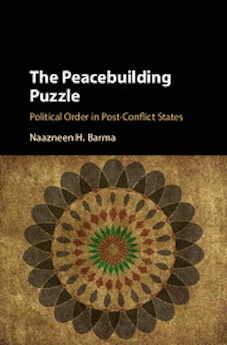By Fred H. Lawson
Foreign troops, often under the auspices of international organizations like the United Nations, routinely intervene in civil wars in an attempt to bring the conflicts to an end and install institutions that can promote political stability and economic prosperity. Such interventions almost always fail to accomplish their missions. Why this happens is the problem addressed by Naazneen Barma’s cogent and authoritative account of three notable peacebuilding operations: Cambodia in 1991-93, East Timor in 1999-02 and Afghanistan 2002-05. In each instance, a UN expeditionary force managed to stop the fighting, supervised the creation of a post-war political arrangement and then watched as influential local actors manipulated the new system to consolidate their own rule and line their own pockets. The promise of liberal-democratic governance remained lamentably unfulfilled.
To explain these similar outcomes, Barma (ΦBK, Stanford University) deploys a form of analytical narrative that combines historical institutionalism with path dependence, whereby initial configurations of power and interest determine the course of subsequent developments. In particular, “peacebuilding interventions themselves deliver sources of patronage to [a favored indigenous elite that] benefits from gradually increasing returns to power, while actively nurturing a political coalition and shaping institutions to their continued advantage.” Despite the marked differences among the agreements that terminated these three civil wars, and the diverse arrangements that characterized their respective post-war orders, individuals and parties that had actively collaborated with the intervention took control of the emerging authority structures and used these instruments to construct networks of clients that kept them firmly in charge.
Rather than abandon the quest to bring lasting peace to war-torn countries, Barma extrapolates two key lessons from the cases she explores. First, international agencies—particularly those based in the West—must stop conflating state-building with the establishment of liberal democracy. Which task merits pride of place is left a bit hazy: The text strongly suggests that top priority should be accorded to creating effective state institutions. Yet cultivating democratic procedures and practices seems equally important. Barma squares the circle by proposing that prospective peacebuilders concentrate on strengthening political parties and incorporating a good deal of popular participation inside the nascent government apparatus. Readers familiar with Richard Sklar’s innovative concept of “developmental democracy” might be able to recommend more promising alternative strategies.
Second, foreign actors must pay much greater attention to locally generated mechanisms of conflict resolution and participatory politics. “The insight here,” Barma observes, “is that surprising governance improvements can be achieved if the puzzle [of successful peacebuilding] is approached through the lens of the governance challenges and problems that domestic elites must solve, instead of through the typical international intervention approach of offering to these elites predesigned solutions and institutions that, in reality, challenge their interests and incentives.” Such mechanisms are repeatedly called “traditional” ways of managing disputes but could better be framed as authentic or commonly-accepted aspects of public engagement in the society at hand.
The Peacebuilding Puzzle makes a signal contribution to scholarship on the impact of foreign intervention in civil wars and belongs in the hands of policy-makers and UN officials as well. Moreover, it is fluidly written and accessible to general readers who wish to ponder the paradoxes inherent in ongoing efforts to make the twenty-first-century world a less dangerous and more hopeful place.
Fred H. Lawson (ΦBK, Indiana University) is Visiting Professor of National Security Affairs at the Naval Postgraduate School.




